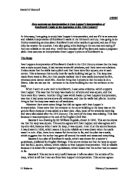“Explain the status and position of European Jews at the beginning of the 20th Century”
At the beginning of the 20th century, the status and position of Jews in Europe varied depending on the country itself. In Russia, the Jews suffered from Persecution, and had to live in shtetls, which meant a Jewish community within a village. The Jews suffered from persecution because of their religious differences, and they suffered from great prejudice. In France and Germany, the Jews had equal rights (by law). However, in Germany, they were still not allowed privileges which most other civilians had. In France, the Jews also had equal rights, although these were not practiced by Jews because of the persecution they still faced.
Russian Jews faced persecution because of their religion and not for their race. They were attacked for their religious views, and were forced to live in small Jewish communities (shtetls). Although they were next to the Christian communities, they didn’t mix and would not notice each other to a certain extent). Jews had no civil rights or any political rights in law. When Nicholas II stated, and maintained, “As long as I am Tsar of Russia, the Jews shall not receive equal rights”. Pogroms were created after the Jews were blamed for the assassination of Tsar Alexander II). The constant attacks caused 2 million Jews to emigrate to the U.S.A. The most famous attack on the Jews was the Mendel Beilis Trial in Kiev, in 1913. He was accused of a ritual murder on 13-year old Andrei Yushchinsky, who had disappeared on his way to school in Ukraine, and whose body was found 8 days later, mutilated, in a cave near a brick factory. A lamplighter had testified that the boy had been killed by a Jew, but not specifically Mendel Beilis. They were trying to find a Jew to use as a scapegoat. During the trial, the lamplighter admitted that he was confused by the secret police. Mendel Beilis faced an all-Christian jury, who had already regarded Andrei Yushchinsky as a saint. Mendel Beilis spent two years in prison, awaiting trial, and this is yet another form of religious discrimination. He died in 1934 after he moved to Israel (then Palestine), which was still under Turkish rule (the Ottoman Empire). During World War One, there were a lot of Russian accusations against the Jews. These included accusations of passing secret, military information onto the enemy. As the communists took over, Jews started to receive emancipation and economical freedom. Lenin was from a mixed Jewish background, but was a Christian. He was strongly against anti-Semitism, and was against racism in general; his thoughts being expressed through his speeches. He was against the pogroms. However, as trade declined, and the Russian economy worsened, the Jewish economic status declined and they started to be blamed. Lenin ran campaigns to get rid of the racism in Russia, with slogans on posters such as “Fight ignorance, alcoholism and Anti-Semitism”, however the discrimination and prejudice continued. When Stalin came into power, the Anti-Semitism was “re-born”, where Jewish religious life was restricted, and Zionism was banned. As well as that, Hebrew was not allowed to be spoken, along with Yiddish. Starting from the 1930’s, Jewish communists were executed. By the 1940’s, the Jews felt more like they were Russians.. All 3 million Jews in Russia felt they were a part of Russia, and that they were assimilated. In conclusion, the status and position of Jews meant that the treatment on the Russian Jews was harsh, but became fairer when Lenin came in to power. However, there was still discrimination against them because of their religion and language. The Russian Jews then felt that they were assimilated into Russia, and they suffered less from prejudice.







